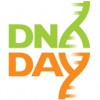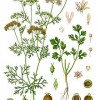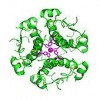Archive for April, 2010

Breast Cancer Screening: Age or Density?
Apr 29th
Next to skin cancer, the most prevalent form of cancer in women is breast cancer. According to the American Cancer Society (ACS) the chance of developing breast cancer over a lifetime is less than 1 in 8. The most extensively used breast screening technique is an x-ray exam of the breast or mammogram. The ACS reports that organized mammographic screening reduces breast cancer mortality by more than 60%, and recommends yearly mammograms starting at age 40. Women with a strong family history of breast cancer, or who have other risk factors, are advised to begin routine screening earlier.
However, there’s no shortage More >

DNA DAY 2010: What, me worry about my DNA?
Apr 29th
Of course, everyone asks me what I think about National DNA Day, to which I usually reply, “Every day is DNA Day at the DNA Learning Center.”
DNA is business as usual for me and legions of genetic researchers and counselors, but its also becoming business as usual for a lot of average people who are interested in their health or genealogy.
People also often ask me how I feel about all the personal DNA data that is becoming available. To which I usually reply, “I’d be a lot more concerned about losing a credit card or my social security More >

Winter Move Over, Spring is Here!
Apr 20th
Seasonal Affective Disorder (SAD) or “Winter Blues”
Spring arrived on March 20th and it was hard to ignore. It was a hot day in Central Park with fellow New Yorkers rushing out to sit in the sun, play ball, or ride their bikes. In my hometown people rushed to the Bluff just to sit in the sand and stare off into the water of Long Island Sound. There were some die hard jet skiers that took the opportunity to get their jet skies into the water (even though the water was an icy 40 degrees). People are craving to be outside; to shake More >

Pharm Crops
Apr 19th
What if vaccines could be eaten instead of injected? Scientists began developing subunit vaccines in the late 1980s; these are vaccines which contain isolated pathogen proteins. It seems that proteins from viruses, bacteria, and parasites can trigger an immune response (are antigenic) even when the pathogens are not present. Furthermore, these proteins can be antigenic when eaten, which has led scientists to explore whether we can genetically modify food sources to create edible vaccines.
Dr. Charles Arntzen (Co-Director of the Center for Infectious Diseases and Vaccinology, The Biodesign Institute and Florence Ely Nelson Presidential Chair, Arizona State University) has spearheaded the More >

Involuntary Sterilization?
Apr 15th
A North Carolina-based charity’s initiative to pay drug and alcohol abusers to be sterilized or choose long-term birth control (IUD) has popped up recently in my Google “eugenics” news alert. Once an addict proves they have had a procedure to prevent pregnancy, they are given $300. Several thousand individuals have participated in the program in the US. The group argues that the policy will prevent the birth of children that will likely become a societal burden or at the very least be raised in an unstable environment. Those who oppose the initiative argue that often addicts get clean with the More >

Cilantrophobia
Apr 14th
Growing up I was a very picky eater. When I didn’t like what my mother had prepared for dinner, I would usually just say, “I’m not hungry” and make myself a peanut butter sandwich. As a grown up, my food choices have changed a great deal, in fact, I enjoy trying new things and watching to Food Network for good ideas.
One of the cooking tips that I have picked up from all of the foodie shows I watch is to use fresh herbs, whenever possible. Believe it or not, that green spring of parsley on my plate at restaurants that More >

Adjusting your moral compass
Apr 6th
It can be kind of frightening to think about it, but there really is such a thing as mind control.
Now, we are not talking Hypnotoad or Professor-X style mind control (not yet at least) but a simple experiment that demonstrates how mind and brain interact and can be manipulated.
In the study conducted by Rebecca Saxe of MIT (http://www.pnas.org/content/early/2010/03/11/0914826107.full.pdf+html)
used a technique call transcranial magnetic stimulation (TMS) to disrupt a region of the brain known as the right temporo-parietal junction (TPJ). As every child knows, one of the best ways to figure out how something works is to take it apart and More >

Possible Future Treatment for Type 1 Diabetes
Apr 5th
Insulin, a hormone produced by the pancreas, signals cells to remove glucose from the blood and store it as glycogen. Glucagon is a protein also produced by cells in the pancreas but it has the opposite effect of insulin. When blood glucose levels are low, glucagon causes the breakdown of glycogen into glucose that is then released into the blood. The insulin is made in beta cells, where as the glucagon is made in alpha cells. In patients with type 1 diabetes, the immune system attacks the beta cells, eliminating insulin production.
Scientists from the University of Geneva have shown that More >

Sexual Selection
Apr 1st
When we think about all of the living things on Earth, we immediately see how different we all are from each other. Many of these traits that might seem bizarre to us, evolutionarily speaking, have a tremendous amount to do with the survival. Many traits have been selected for by the opposite sex, because it will help the passing on of their design information.
One very amazing example of this is the Widowbirds that live in the grasslands of southern and eastern Africa. During the non-mating season, the males and females look very similar to one another. Once breeding season begins, More >
